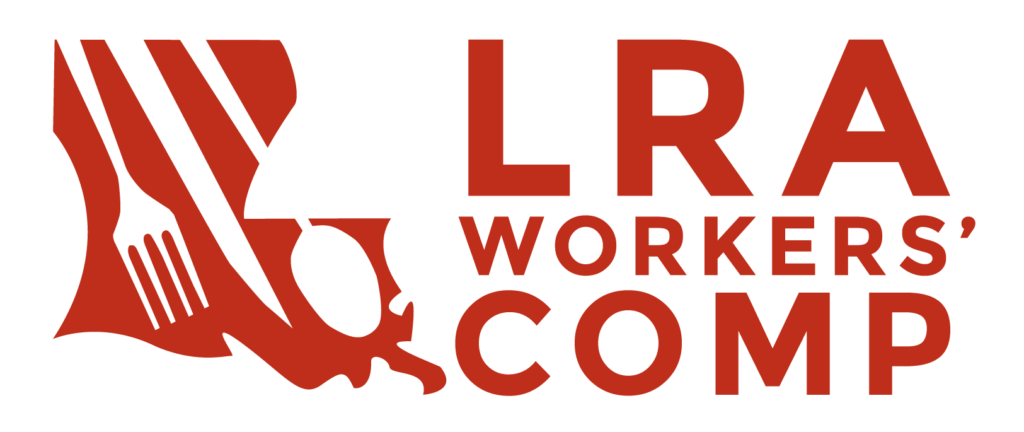Workers’ Comp FAQs
Frequently Asked Questions (FAQs)
The Louisiana Restaurant Association (LRA) Workers' Compensation Program is dedicated to providing comprehensive coverage and support for our members. To help you navigate the details of your coverage and understand the benefits available, we’ve compiled this FAQ page.
Here, you’ll find answers to common questions about our workers' comp policies, claims process, safety services, and more. Whether you’re a new member or looking to optimize your current coverage, this resource is designed to assist you every step of the way.

About Workers' Comp
Required by Louisiana Law; LRA Workers' Comp your industry-specific solution
Is Workers' Compensation insurance required for employers in Louisiana?
Yes, Workers' Compensation insurance is required for nearly all employers in Louisiana who have one or more employees, whether full-time, part-time, seasonal, or minors. This requirement applies regardless of the number of hours worked. Certain exemptions exist, such as for domestic employees and some real estate salespersons.
What are the penalties for employers who do not have workers' comp?
- If an employer fails to secure Workers' Compensation insurance, they may face significant penalties, including fines up to $250 per employee for a first offense and up to $500 per employee for subsequent offenses. Additionally, employers could be held responsible for all medical costs and compensation benefits that would have been covered under the insurance, along with potential legal fees. The Louisiana Workforce Commission also has the authority to issue a cease-and-desist order to stop the business operations of non-compliant employers until proper coverage is obtained.
What is the LRA Workers' Comp?
- The LRA Workers' Comp program is a Self-Insured Fund, a non-profit, state-regulated, member-funded pool that provides workers’ compensation coverage. It operates on a fund year from January 1 to December 31 and is licensed and approved by the Louisiana Department of Insurance.
Coverages
What types of stop loss coverage are included in the LRA Workers' Comp program?
- Specific Stop Loss: Statutory limits.
- Aggregate Stop Loss: 85 percent of audited premium.
- Employer’s Liability: $1 million – $1 million – $1 million.
Who is the excess insurance carrier for the LRA Workers' Comp program?
- The excess insurance carrier is Midwest Employers Casualty, rated A+ (Superior), FSC XV by A.M. Best and A+ (Strong) by Standard & Poor's.
Claims
Report a Claim
Submit Online, email or call claims@lra.org (504) 454-2277 or (877) 257-2743
How does the LRA Workers' Comp handle claims?
- LRA Workers' Comp provides timely and efficient claims handling from their Metairie headquarters without using third-party claims management. The claims team, with over 200 years of combined experience, understands the unique risks in the hospitality industry. They monitor medical treatments, payment of indemnity benefits, and the employee's recovery progress, ensuring appropriate and timely care.
Why is it important to report workplace accidents or injuries immediately?
- Immediate reporting ensures appropriate and timely medical treatment, helps manage expenses, and reduces the overall cost of claims. All workplace accidents or injuries, regardless of severity, should be reported to LRA Workers' Comp Claims team immediately.
What services are included in Medical Bill Review and Utilization?
- LRA Workers' Comp contracts with medical providers to negotiate fees, utilize third-party providers for medical charge reviews, ensure compliance with state regulations, and manage pharmacy costs. This is part of their cost management efforts to provide cost-effective workers' compensation coverage.
Loss Prevention
Safety Video Library - On Demand Here
What safety and loss management services are offered to LRA Workers' Comp members?
- Members receive complimentary safety and loss prevention services, including facility visits, safety plan reviews, risk assessments, and content for safety meetings. LRA Workers' Comp also offers a range of specialized safety services and training programs.
How does LRA Workers' Comp support workplace safety training?
- LRA Workers' Comp offers a complimentary on-demand safety video library, provided by Midwest Employers Casualty, which can be integrated into your training process to help ensure a safe workplace.
How does LRA Workers' Comp support workplace safety training?
- LRA Workers' Comp offers a complimentary on-demand safety video library, provided by Midwest Employers Casualty, which can be integrated into your training process to help ensure a safe workplace.
What Safety Services are offered to LRA Workers' Comp members?
- LRA Workers' Comp provides a comprehensive range of safety services to help members maintain a safe workplace and minimize the risk of injuries. These services are offered at no additional cost and include:
-
- OSHA compliance audits
- Fleet safety program development
- Security assessments/program development
- Hazard communication
- Lock out/Tag out
- Bloodborne pathogens
- Back injury prevention
-
- Personal protective equipment (PPE)
- Respirator safety
- Hearing conservation
- Emergency preparedness
- Fire extinguisher training
- Measuring floor friction levels.
- On-Demand Video Library
What is the Second Injury Fund, and how can it benefit my business?
- The Second Injury Fund provides supplemental coverage if an injured employee has an existing health issue or past injury that could contribute to the current injury. If approved, this reduces the overall cost of the claim for both the employer and LRA Workers' Comp.
-
- Second Injury Fund Questionnaire - English
-
- Second Injury Fund Questionnaire - Spanish
Payroll Compliance Reporting
What is the payroll compliance reporting process?
- LRA Workers' Comp conducts payroll compliance reporting annually to compare actual payroll with the reported amounts. If actual payroll is lower than reported, a credit may be due; if higher, an additional premium payment may be required.
How is my workers' comp premium determined?
- Premiums are based on payroll and/or remuneration, which includes wages, commissions, bonuses, and other forms of compensation. During compliance reporting, documentation is required to verify payroll amounts and identify items not subject to workers' comp premium.
How should contract labor be handled during payroll compliance reporting?
- Employers should request a current "Certificate of Insurance" from all contractors or service providers to verify their workers' comp coverage. Without this certificate, additional premium may be assessed.
Who can be excluded from workers' compensation coverage?
- Sole proprietors, partners, and executive officers who own at least 10% of the entity can choose to accept or decline coverage. There are specific payroll limitations for those included in coverage.
How can I save money on workers' compensation premiums?
- Maintain accurate wage records, require certificates of insurance from contractors, and verify payroll records to avoid unnecessary premiums.
